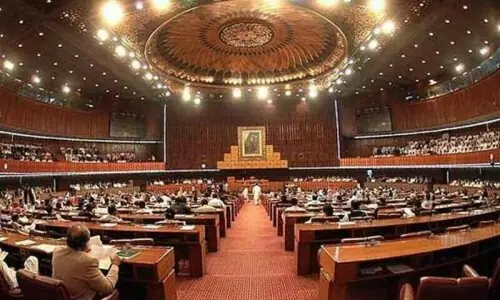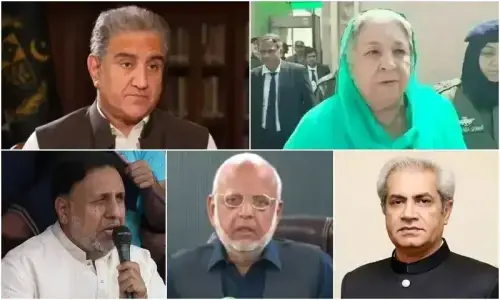ISLAMABAD: The Supreme Court hearing a petition seeking disqualification of the Pakistan Tehreek-i-Insaf (PTI) top leadership reminded the petitioner on Thursday of his responsibility to come up with irrefutable evidence to disqualify someone through Article 184(3) of the Constitution.
“This bar cannot be shifted to the respondent and, therefore, the petitioner has to present a comprehensible case,” Justice Umar Ata Bandial told Mohammad Akram Sheikh, the counsel for petitioner Hanif Abbasi of the Pakistan Muslim League-Nawaz.
Mr Abbasi is seeking disqualification of PTI chief Imran Khan and secretary general Jahangir Khan Tareen for not disclosing assets and owning offshore companies, as well as for PTI being a foreign-aided party.
Akram Sheikh, however, reminded the court that through its review judgement in the Panama Papers case, the law regarding inquisitorial proceedings had been evolved, and by accepting the existence of offshore company Niazi Services Limited, the respondent (Imran Khan) himself had got the onus shifted to him.
At the conclusion of the hearing by a three-judge SC bench headed by Chief Justice Mian Saqib Nisar, the court assured all and sundry that it was not going to compromise justice only to please someone.
“Which office is higher than that of the chief justice,” the chief justice asked, saying that “we also have to answer on the Day of Judgement”.
When Naeem Bokhari, who represents Imran Khan, asked the court to completely ban television programmes on pending matters, the chief justice asked the counsel to appreciate the level of patience the court had demonstrated and said justice would not be compromised at the behest of anyone else.
The court also turned down a request by Akram Sheikh to summon from the Election Commission of Pakistan the nomination papers filed by Imran Khan from five different constituencies during the 1997 general election.
Referring to the nomination papers filed by Mr Khan in 2002, Mr Bokhari said the maximum outcome of not disclosing the assets of his client’s ex-wife Jemima Khan was that it would have been rejected by the returning officer, but it would not entail any disqualification.
On Thursday, Attorney General Ashtar Ausaf, on a court notice, advanced his arguments to the challenge made by Mr Tareen against sections 15-A and 15-B of the Securities and Exchange Ordinance 1969 that deals with insider trading.
Can Mr Tareen, the AG asked, now impeach or challenge the vires of a law by way of defence when he acted under the erstwhile law almost 10 years ago and when he did not throw a direct challenge to the same earlier.
“Can a collateral attack be made by challenging the vires of the law before the Supreme Court for the first time when earlier proceedings in the event of insider trading had been suffered by him [Mr Tareen]? Can in a writ of quo warranto against Mr Tareen all the orders and actions that have already attained finality be reopened, more so when by way of the act of parliament such actions had been validated and were never challenged before any court of law?” he asked.
The attorney general pointed out that facts relating to allegations of insider trading were never disputed by Mr Tareen; rather he joined the proceedings initiated by the Securities and Exchange Commission of Pakistan (SECP) through a show-cause notice on Dec 8, 2007. He said Mr Tareen had neither objected to any notice nor the vires of the law then.
At this, the court wondered whether there was any bar not to challenge the vires of the law at any time if he did not do the same earlier.
Mr Ausaf said such challenges could be thrown out, but there was a method and pointed out that Mr Tareen not only admitted the events or the allegations of insider trading, he was also not asking for the reversal of the action already taken on the issue of insider trading or the return of the gains he had paid to the SECP.
“Mr Tareen is not raising an issue through direct proceedings or a petition,” the AG said, adding that when there was a challenge to a particular event or action, it ought to be brought in a time prescribed, otherwise it would be a collateral challenge.
He said Mr Tareen was not saying that the events in insider trading were not true or his gardener or cook never acted on his behalf, rather he was contending that the law under which he was accused of insider trading was illegal.
Published in Dawn, November 10th, 2017
































